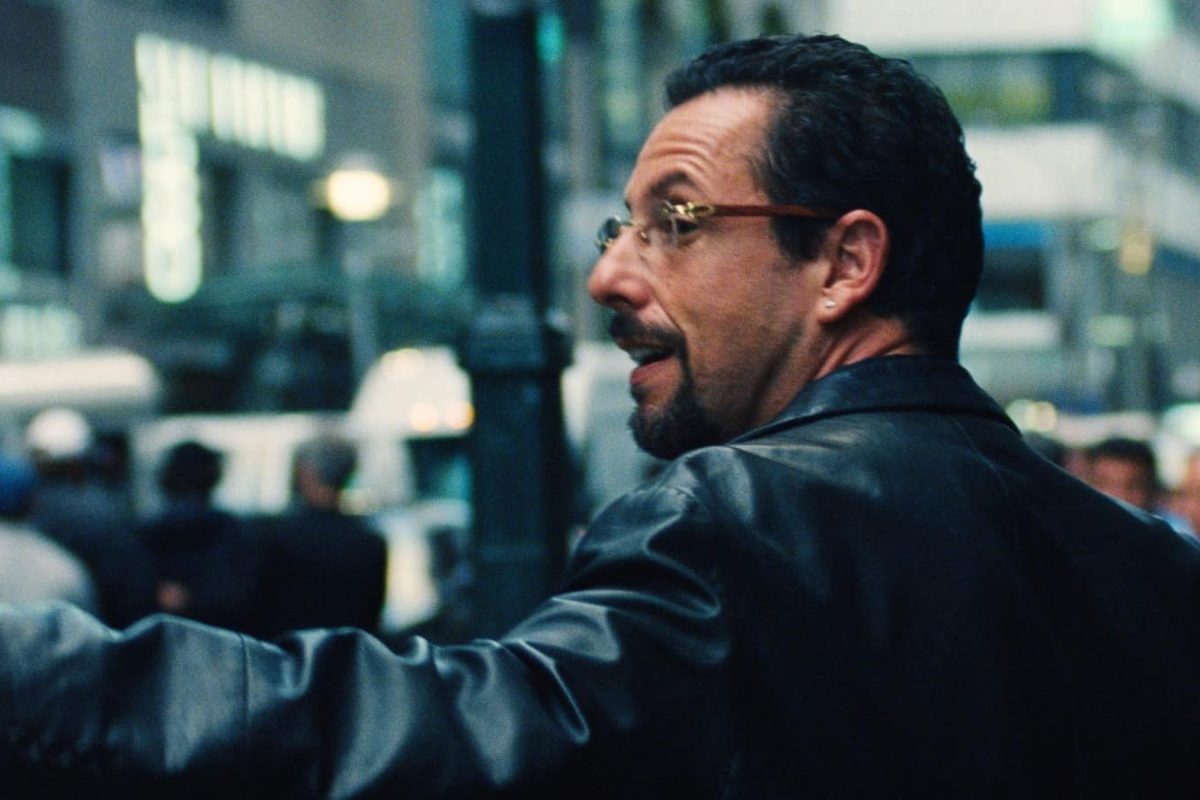Uncut Gems features Adam Sandler as Manhatten jeweler and gambling addict Howard Ratner, a character who embodies capitalism. The film acts as an indictment of the short-sightedness of capitalism.
The Safdie brothers’ second major feature film, Uncut Gems, has been released to critical acclaim. It follows Manhattan jeweler Howard Ratner – played extremely well by Adam Sandler – as his gambling addiction ties him and his business into ever tighter knots.
The film is in the realist style, meaning it is shot without the glamour and exaggerated characters normally associated with Hollywood. Instead, it feels gritty and all the characters seem plausible. Two real life celebrities, the basketballer Kevin Garnett, and the singer The Weeknd, even play themselves. As a result of this realism, Howard Ratner’s predicaments feel even more desperate and stressful.
The protagonist should be seen as an embodiment of capitalism, and as such the film is basically an indictment of the irrationality, short-sightedness and unsustainability of the economic system in which we live.
Flimsy foundations
Despite appearing relatively successful – Howard owns his own Manhattan shop; regularly has famous customers come in, with whom he takes selfies; and owns a large house and Mercedes Benz – this is clearly all built on the flimsiest of foundations.
We quickly learn that little or nothing in his possession is actually owned by him. Early on, some bailiffs violently enter his shop and forcibly take his watch off him in payment for something – in itself clearly a bad sign. We then hear him on the phone to the loan shark for whom these men work, complaining that this watch they’ve taken is actually not his and he needs it back.
This is a line we hear throughout the film – ‘this isn’t actually mine, I need it back’. He also puts a photograph of himself with thousands of dollars in his hand on Instagram, which infuriates his loanshark, who has not been paid what he is owed. Again, we hear the excuse that this money is not actually his.
When basketball superstar Kevin Garnett makes an appearance in his shop, he begs Howard to let him borrow an opal Howard has just imported from Ethiopia. In exchange, he lends Howard his huge Celtics ring, which represents Garnett’s NBA championship winning season. Howard immediately runs out and pawns this highly valuable ring that doesn’t even belong to him, so that he can make an enormous bet on a game of basketball in which Garnett is playing. The audience is left in no doubt that this will not go well.
Uncut Gems (2019) is now on Netflix! This movie is so chaotic but in the BEST WAY. The ending will definitely mess you up. Must-watch. pic.twitter.com/QdFEzqkvlD
— good films make your life better (@watchlist0) February 1, 2020
Commodity fetishism
The above mentioned opal’s movements are extremely important to the fortunes (or lack thereof) of our protagonist, which again makes Howard and his life a perfect expression of capitalism.
Marx describes how under capitalism, commodity fetishism takes hold. The fate of society seems to be determined by the movements of impersonal objects – that is, commodities – which seem to acquire social relations of their own. In other words, we worship the products of human labour for their apparent value, and we let our lives be determined by the fate of these unconscious objects.
In Uncut Gems, both Howard and Kevin Garnett worship this opal: Garnett believing it to bring him luck on the basketball court; Howard needing its market value to save him from the thugs of his loan shark.
Out of control
Howard’s out-of-control gambling addiction is the centre of the film, and again in this way the protagonist is an embodiment of capitalism.
He is constantly ‘over leveraged’, making massive bets with other people’s money (or rings). He is obsessed with making the highest possible stakes bets; he lusts after success and money for the sake of it. On more than one occasion, he and his girlfriend are shown to get-off on the prospect of winning a big bet, Howard chanting ‘I’ve hit big baby, I’ve hit big’.
Howard does not seem to have an ‘off button’. He is constantly on the go, scheming and smooth-talking, and lacking all sense of perspective. The high-stakes situations in which he is constantly embroiled are intelligently portrayed by the directors by having him constantly perform many actions at the same time.
At one point he makes an extremely important and very tense phone call, something that would absorb the attention of most people. And yet Howard is so busy that he performs other duties at the same time, such as weighing himself on the bathroom scales. This need to combine multiple unrelated tasks to save time is no doubt a predicament many workers will understand well.
Ponzi scheme
 Addicted to risk taking, he is incapable of grasping what the audience does: the inevitable disaster when his schemes come crashing down. There is a perpetual feeling of doom, of the unsustainability of the system that he has built. His whole life is lived as a ponzi scheme.
Addicted to risk taking, he is incapable of grasping what the audience does: the inevitable disaster when his schemes come crashing down. There is a perpetual feeling of doom, of the unsustainability of the system that he has built. His whole life is lived as a ponzi scheme.
When things don’t go his way, he talks over those giving him the bad news, essentially denying the truth and trying to make reality what he wants it to be. In one scene, when he realises the auction of his prized opal will not yield as much money as he had hoped for (money he desperately needs in order to pay off his gambling debts), he suddenly ropes in an elderly relative, getting him to ‘bid up’ the opal to fraudulently raise its price.
Just like the bourgeois politicians in the financial crisis, he delays the inevitable reckoning that the system demands by making even more outlandish bets and promises, meaning that the reckoning will be even greater when it finally does come, as indeed it must.
Uncut Gems is not an entirely pleasant film to watch, as it is highly stressful throughout. This, however, is clearly the point. The film effectively puts the viewer through the rat-race insanity of the capitalist system, and reveals it for what it is – doomed for destruction.






